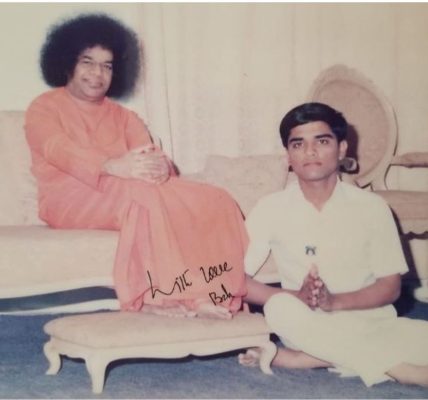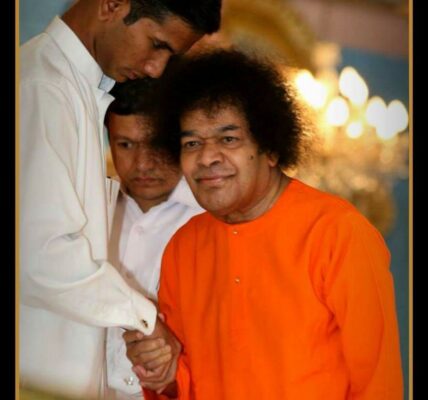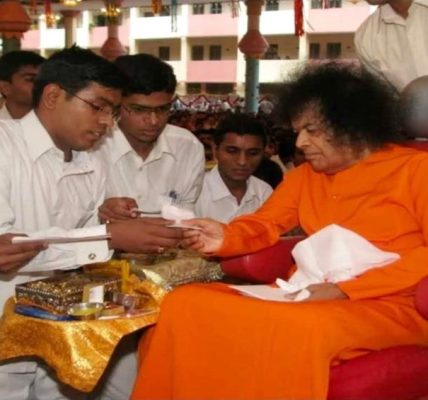Dr Sunam Gyamtso

True vision
It was almost four months having joined the Sri Sathya Sai Arts, Science and Commerce College, Brindavan in Whitefield, Bangalore, that I felt the need to ask Swami for permission to go to the city to get my first pair of eyeglasses. This was around the third week of August 1978. Despite being shortsighted for a long time, I had never liked wearing glasses notwithstanding the discomfort. The Independence Day musical concert in the college auditorium on 15 August was the turning point. My discomfiture was palpable at my inability to read the song sheet spread before me on the stage while a loose bolt on the mike-stand made it tilt and fall on me repeatedly as I tried each time to lift it back. The audience had a good laugh at my expense while in utter nervousness I forgot the very tune of the song that I had been made to learn just the previous evening.
Beloved Bhagawan not only allowed me to go to the city, but also arranged the hostel Matador van to take me there with a senior as my guide. He instructed me, “Go to Mulani Opticians on Brigade Road and return home as soon as the task is done. Don’t loiter around in the streets despite all temptations”. He gave me money to pay for the glasses and also for a sumptuous meal in a hotel.
The optician was shocked at how I had managed without specs for so long since my power turned out to be minus four! We returned back soon, since the opticians were very efficient and didn’t make me wait for long.
During the evening as Bhagawan stepped out of His bungalow to give Darshan at the Sai Ram Tree, He called me and asked, “Did you get your specs? Did you both eat well?” We replied in the affirmative. Then He asked “Kidhar hai?” (Where is it?). I offered the specs to Him for His divine touch.
He not only took it out of its case, but also put them on His own eyes. Instantly, He winced and remarked, “Pagal! Itna power! Kaise kiya ab tak?” (Mad person! The lenses are so powerful. How did you manage till now?) Then He asked me to wear it and as I did, He asked me, “Ab theek dikhta hai?” (Can you see clearly now?)
I said, “Yes Swami”.
Then He said something that I understand was His preliminary spiritual instruction to me though I hardly understood it then in its deeper perspective. “Glasses pehanney sey dristhi nahin khoolta hai. Pehle dristhi dosham ko saaf karo. Phir andar ki drishti khol sakta hai. Outside vision limited hai. Inside vision unlimited. Antar drishti nahin – real blindness. Aankh hai phir bhi blind. Antar dristhi kholo – only love, only compassion. That is real seeing.”
Swami never displayed His prowess and mastery at speaking languages. For Him, what matters is instant and effective communication that He at times accomplishes without speaking a word. He has spoken to me in fluent Bhutia language. I have heard Him speak Mandarin, Nepalese, Italian and French. His message that day in colloquial Hindi is what I have reproduced here. The meaning in English would be “You don’t start seeing by merely wearing glasses. First remove the cataract and unblock the inner vision. The outer vision through the external eyes is limited while the inner vision is unlimited. Sans the inner vision, you are really blind. See with the inner vision and you will find only love and compassion all around. That is real seeing.”
What is in a name?
An instructive mantra that our beloved Bhagawan gives everyone, not only at the first tryst with Him, but also and sometimes repeatedly over the months and years is, “Where are you from?” followed by its sequel “What is your name?” Invariably He adds, “What is the meaning.”
My turn for this initiation came in the very first year in His College as a pre-university student. He initiated me into all these three mantras. I replied to the first divine query: “I am from Sikkim, Swami” (Wondering how God could not know about me?)
Pat came His reply that almost made me jump with surprise: “Not Sikkim. Seek Him.”
Nobody in my life had taught me such a succinct definition of the name of my birthplace. I learnt that day that every name and form reminds us of God’s omnipresence and glory and the purpose of discovering it in everything in nature.
To the second question I answered, “Swami, Sonam” and He asked me the third question. I remembered what I had been taught by my Tibetan teacher and replied, “Ocean of good deeds”.
Very emphatically He said “Nahin. Sonam ka koi meaning nahin. Tumhara naam Sunam hai – meaning Good Name”.
For another one and a half years – that is till the completion of my pre-university course I didn’t go home to Sikkim because none of us felt like leaving His presence even for a moment.
In the year 1980, I returned to Brindavan after spending 20 days in Sikkim on summer vacation. The first question Bhagawan asked me was, “Did you change your name?”, He asked me as though He had given me a new name only the previous day and not a year and a half back!
I happily replied, “Yes, Swami… Officially changed”.
Then He told me something that will ever be etched in my memory, “Changing your name does not change anything. You can assume hundred such names in a lifetime and yet remain the same stubborn old self. Your name denominates not only your form, but your character and who you really are. Live up to your name.”
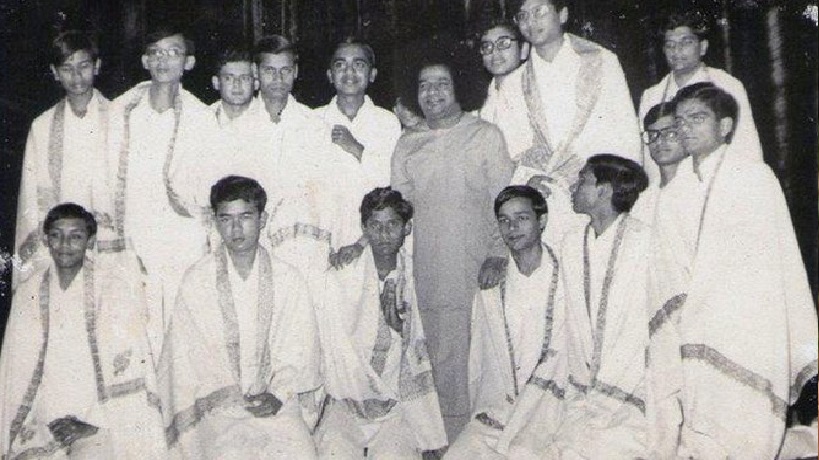
The Jhoola concert
This is a sequel to the introductory instruction that I received from Bhagawan when He asked me my name for the first time. After rechristening me as ‘Sunam’ and explaining its meaning, Bhagawan praised me for good singing and said, “Tumko Jhoola mey gaaney kaa chance deta hai.” (I will give you a chance to sing at the Jhoola.)
I had no clue about the Jhoola and asked one of the seniors who informed me that Jhoola was a special occasion during the Dussera or birthday celebrations when Swami reclined on a silver swing that devotees took turns to swing while some of the best musicians were privileged to perform in His immediate presence.
I was elated to the extent of hitting the ceiling in utter arrogance that I was being equated to accomplished musicians by Bhagawan Himself! Of course, the chance to sing at His Jhoola never came. Instead my senior brother Rupak Changakoti and his brother Hirok Changakoti along with other gifted singers were asked to sing the Ramakatha while I got the chance to accompany them on the accordion. It was indeed a humbling experience.
The ensuing year, I was in my pre-university second year (1979), and had been a part of the college Bhajan group for more than a year. My repertoire of Bhajans had accumulated enough to make me feel in all my pomposity that I was one of the living authorities on Sai Bhajans.
Quite by fluke, I happened to compose a bhajan ‘Karuna Sindho Dasharath Nandana‘ that came to be liked by everyone. When I sang it before Beloved Bhagawan, He commented, “Hmm! Accha Hai. Kaun compose kiya.”
When I said, “I did it by Your grace,”
He retorted, “Very happy. I will let you sing for Jhoola.”
I then mustered all my courage and said, “Swami, You told me the same thing the last year. I never got a chance to sing during Your Jhoola.”
Disregarding my temerity, He asked me, “Kabhi dil ka jhoola jhoolaayaa hai?” (Have you ever swung the swing of your heart?)
I was lost for words. He continued, “Place me in your heart. Let your breath be the song and the heartbeat the rhythm. That is the greatest Jhoola program. You are free to perform anytime.”
These are reminiscences of those initial days in the paradise called Brindavan where God incarnate, Bhagawan Sri Sathya Sai Baba, spent nine months in a year with His dear students.
I have shared some of the first lessons taught by Him in His inimitable way that defies every conventional way of teaching. His style is lucid and simple and His teachings are wedded to everyday living and life. There are no complex philosophies, aphorisms, mantras, postures, rituals, and liturgies. Just follow in His footsteps and implicitly obey his commandments.
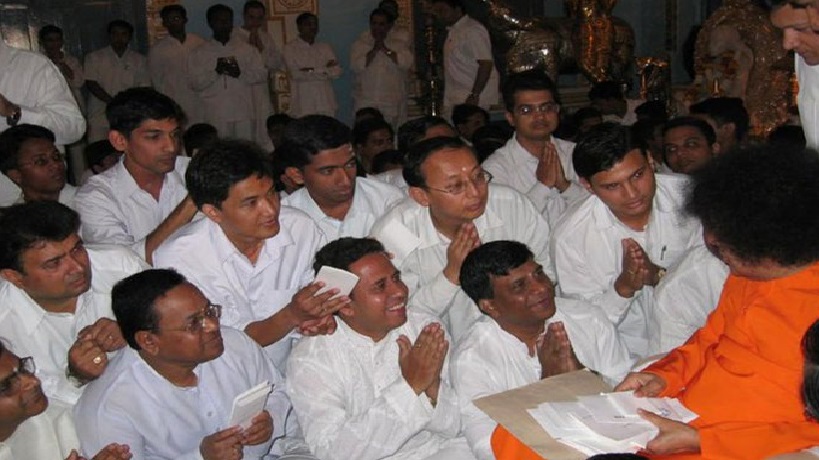
Swami once told us in Brindavan, “Simplicity is the hallmark of this Avatar. My language is simple – my name is simple – my ways are simple – my dress is simple – my form is simple – my looks are simple – my tenets are simple – Sai is simple.”
‘Love All Serve All’ is the crux of His message.
Realize the oneness and universality of the Spirit that appears in different forms with different names. When you love, you see the same Spirit in everyone – everything. Love is the way and the goal. The end of life is not to become a great erudite scholar or pundit but to realize unity with divinity through purity. Have we ever tried looking at the world from this Sai perspective? Have I ever looked into someone’s face and discovered myself? This is our heritage, the Sai Parampara that goes on forever.
My life is my message, expansion is my life;
No reason for love, no season for love;
No birth No death.
A priceless inheritance bestowed in the idiom of simple practicality.

